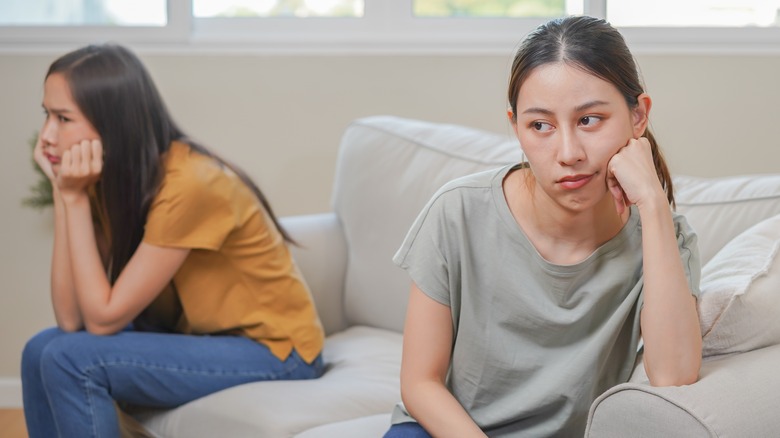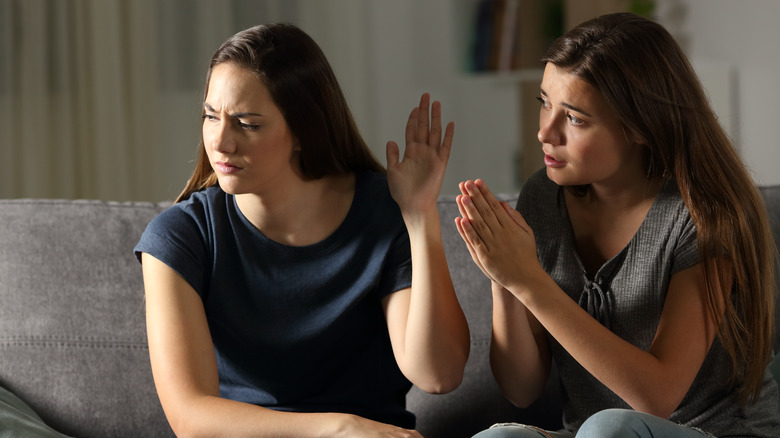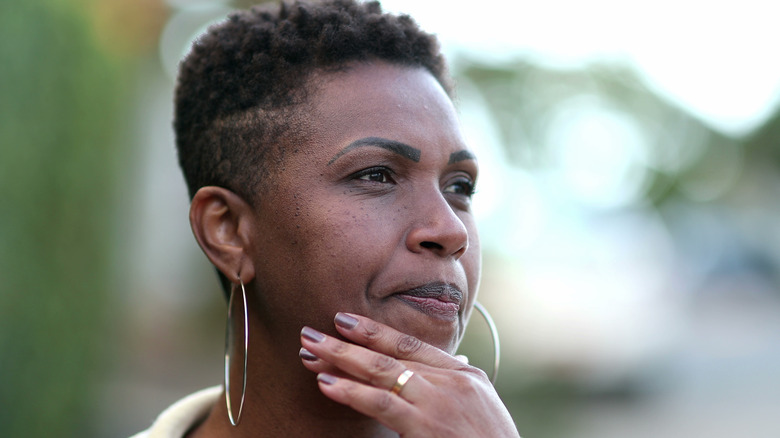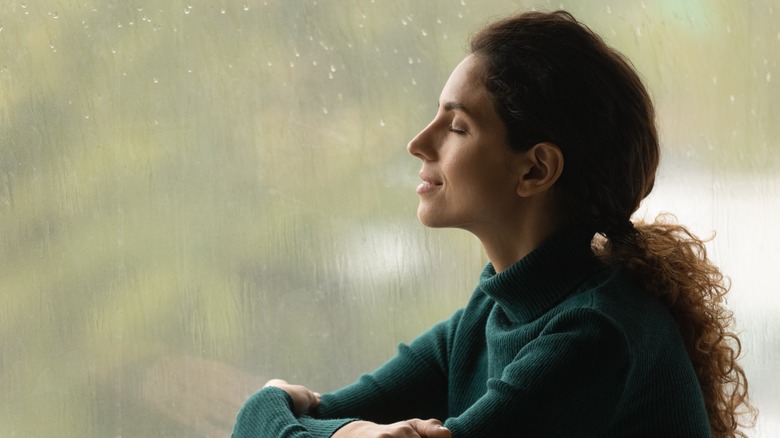How To Heal From A Friendship Breakup
We may not like to admit it, but, sometimes, friendships come and go. Remember in high school when we all pledged to our friends that we'd be best friends forever? As children, we're often conditioned to believe that friendships last forever. And this concept of BFFs never really goes away. Just think of all of the TV shows that preach the eternal nature of friendship. Whether it's "Sex and the City," "Friends," or "New Girl," there are countless examples in pop culture of lifelong friends. Unfortunately, just like romantic relationships, platonic relationships aren't all meant to last forever. Just like couples, friends sometimes drift apart and change. Some friendships can even become toxic.
"There's this expectation that friendships should be easy for adults," Miriam Kirmayer, a clinical therapist, told Time. "And that obviously isn't true for many people." People crave new things, develop new interests, and even form new lifestyle habits — and sometimes, this means that their friendships change, too. When you and your friend go your separate ways, it can be tough. "You'll actually go through a bit of a grief process with it, and that's okay," psychotherapist Marni Feuerman added.
Emotionally, cutting ties with a friend can feel strangely similar to a romantic breakup. If you and a friend have recently gone through a painful parting, whether you or your friend initiated it, you may be wondering how to move on. Here are some expert-backed tips on dealing with a difficult friendship breakup.
Don't minimize how the breakup made you feel
We have a tendency to think of romantic relationships as being more meaningful than friendships. So, oftentimes, people assume that breaking up with a friend is less traumatic than breaking up with a partner, but breaking up with a friend can be equally heartbreaking. In fact, they can even sometimes be worse because they are more confusing. It's important not to push down your feelings but acknowledge them for what they are.
"We can have deeply meaningful bonds with our friends, and going through a friend breakup can be an incredibly painful thing," Juulia Karlstedt, a BACP accredited therapist, told The List. There will always be a grieving process, so it's important to give yourself time and space to feel the full range of emotions that come with this process. "We are grieving the loss of the friendship we had and the possibility of the friendship we hoped to have," Karlstedt explained. "When we try to push down or minimize our feelings what we often find is that those feelings hang around for much longer; we have to feel our emotions to be able to process them."
By giving yourself the space to sit with how you're feeling, even if your emotions feel overwhelming, you may actually come to terms with the friendship breakup a little faster — even if it's a lot harder in the meantime.
Stick with your weekly schedule (within reason)
Friendships sometimes give us a feeling of structure — both emotionally and practically. When you go through a breakup with a friend, your whole life may suddenly feel out of kilter — especially if you and that friend used to spend lots of time together. You may suddenly feel untethered when your weekly coffee dates, brunches, and WhatsApp chats have disappeared.
Instead of letting yourself fall out of other habits and patterns, try to stick to your weekly schedule so that things feel as normal as possible post-breakup. If you feel like you are forcing yourself to do things when what you really want is time to be by yourself, though, listen to what your body is telling you.
"Sometimes we need a break and we need to recharge and/or grieve," Allison Raskin, author of "Navigating Romantic Relationships When You Have Anxiety, OCD, and/or Depression" and podcast co-host of "Just Between Us," told The List. While it can be great to keep up your usual habits, only do the things that feel right — and, of course, if you need a little break from your regular routine, give it to yourself.
Prioritize self-care
When we go through a breakup — either a romantic breakup or a friendship breakup — we sometimes end up slacking on our own hygiene and self-care. If we're feeling sad about the loss of a relationship, it can be tempting to put less effort into things like showering, cleaning the house, and washing clothes. "Self-care" is a term that gets bandied around a lot these days, but taking care of yourself is one of the best things you can do when you're grieving a lost friendship.
"Self-care comes in many forms, and what feels right for one person may not be right for another," Juulia Karlstedt told The List. "It is a form of self-kindness where we are taking care of our physical, mental, and emotional well-being." She suggests thinking about what makes you feel cared for. "For some people, this might look like spending time with other loved ones, journaling, taking care of your physical needs, or meditating," she said. If you are struggling to figure out what self-care looks like for you, you can think about what kind of support you'd be offering to someone else going through the same situation and try to provide that support for yourself."
When things with a friend end, our brain can trick us into thinking that we aren't worth being friends with, so be a good friend to yourself to rewire those thought patterns. Self-care is a great place to start.
Be honest with yourself about the breakup
Facing up to why this friendship didn't work might be tough, but at the end of the day, it can also be helpful. While it's important to find ways to move on and accept the friendship ending, it can also be helpful to spend some time analyzing what actually went wrong in the first place. By looking at your past friendship, you can learn from any mistakes you may have made and set resolutions for future friendships. You might also begin to realize why this friend may not have been the right friend for you.
Think back to when things started to go wrong. "Friendships are complicated and it's likely that both parties hold some level of responsibility," Allison Raskin said. "Being able to hold yourself accountable and recognize what you hope to do differently in the future can be helpful. That way, you aren't repeating the same mistakes or patterns in the future."
Analyzing your friendship isn't just a way to learn and grow. By assessing your friendship after it ends, you may come closer to finding some sense of closure. You may also find it easier to move on with confidence in your new friendships.
Try not to place blame on yourself or your former friend
As you begin to contemplate why your friendship ended, you may find yourself placing blame. You might say to yourself, "If I hadn't said this, then maybe she'd still be my friend" or "If she hadn't done that, then maybe our friendship would have worked out." While it can be normal to look for people to blame, it's rarely helpful — or accurate. Instead of trying to figure out who is at fault, try to accept what has happened and learn from it.
Of course, sometimes, there is some fault involved. What should you do then? "Friendships end for many reasons," according to Allison Raskin. "Sometimes it is one person's fault more than the other. All we can hope to do is learn and heal so our future friendships are different."
If you realize that you are at fault for certain things, don't be too hard on yourself. Acknowledge what went wrong, and figure out what you can take away from the experience.
Don't expect to have all the answers
When a platonic relationship comes to an end, you'll likely crave a final conversation or that last meet-up. "Our brains don't like unfinished business or messy endings," Juulia Karlstedt told The List. "When friendships end, we often don't get the closure we hope to be able to have, and our brains can become fixated on trying to answer all of the unanswered questions we still have."
Instead of fixating on those unanswerable questions, try to change your focus to something else. Even though thinking about your relationship can feel good, it often becomes unhealthy after a while.
"When we ruminate, it can feel as though we are processing our feelings about a situation, but we often we are trying to 'logic' our way to a solution for our emotional pain," Karlstedt explained. "If you are getting caught up in ruminating over a thought you've already tried to think through when you notice an unhelpful thought come up; acknowledge it, take a deep breath and connect to your physical body, and then engage with something meaningful to you."
Feel your emotions and then send them off
If you're struggling with strong emotions in the aftermath of a friendship breakup, you aren't alone. It's perfectly normal to feel sad, angry, upset, and blindsided by a friend's decision to end the relationship. You may find yourself trying to ignore or push away these feelings. Instead, remember that you are ultimately in control of which feelings you choose to focus on and hold onto.
Experts often recommend letting yourself feel your emotions. After doing so, you'll be better equipped to let them go. It may sound counterintuitive, but as Allison Raskin explained, "One way for feelings to have less power over you is to let yourself feel them instead of avoiding them." She continued, saying, "By letting yourself grieve and process, it's likely you will start to heal. Even if you never fully get over it. And no one says you have to!"
Visualize your body as a lake and your feelings as leaves that fall into the lake. Then, imagine a stream slowly carrying the emotions around the body. When you realize that your emotions don't have to be heavy and stagnant, you may begin to feel a little freer — even with these emotions still whirling around. This gentler approach to your emotions will make them less intimidating and more surmountable. Plus, it will help you to slowly allow more space inside yourself for new, happier emotions.
Spend time with other friends
When a friend calls it quits with you, it can, of course, be crushing. But it's important to remember that you still have other friends who value your friendship — friends who can give you what you need and who want what you have to offer. Spending quality time with your other friends can help you rebuild your confidence and imagine a future without your old friend.
"It's important to remember that just because one friendship has ended, the role of friendship in your life remains important," Allison Raskin told The List. "Spending time with other friends can help you remember all the good that comes from friendship and might also highlight what type of friends you want to keep moving forward."
The more time you spend with people who also want to be spending time with you, the more you'll understand what a healthy, happy friendship looks like. Just be careful not to spend too much time talking about your friendship breakup with your other friends. While they will hopefully try to help you move on, it's important to focus on building relationships that don't revolve around your friendship breakup. This way, you'll be able to focus on the future rather than the past.
Make some plans for the near future
Losing a friend doesn't just mean losing an important relationship — it can also mean losing the future you had planned together. When you and a friend decide to part ways, you will likely find yourself mourning the loss of your time spent together. Maybe the pair of you loved to grab lunch together every weekend, or maybe you had discussed taking a trip together in a few months. When your friend decides they no longer want to maintain your friendship, it's normal to mourn your lost future together. But why not craft new plans?
"Having something to look forward to is always a great tip," Allison Raskin told us. "Try to plan something that you have wanted to do for a long time or an activity that you know you always enjoy. Even if you aren't as excited to do as you normally are, chances are you will still receive some benefit from following through with it!" Remember, you don't have to stop doing the things you used to enjoy with your friend just because the friendship has run its course.
Try to avoid reaching out to your old friend
If your friend is the one who ultimately decided to sever ties with you, you may find yourself tempted to reach out. Just like in a romantic breakup, you could very easily end up drunk texting your former bestie late one Saturday night. Or, after a few weeks, you might think about giving them a call to see if they've changed their mind. However, it's usually best to avoid reaching out.
"If the friendship is no longer tenable, it's probably best to learn to live without them," Allison Raskin told us. Reaching out could even make things worse rather than better. "Maintaining contact might create more tension or bad feelings," Raskin explained. "You never know what will happen in the future and if you will reconnect one day, but in the immediate aftermath, it's helpful to focus on yourself instead of them."
Speak to a therapist
The end of a friendship can be traumatic to say the least. While it's possible to work through your emotions alone, don't feel like you have to hide what you're going through.
If you are struggling to come to terms with a friendship breakup, it can be beneficial to seek out a professional's help — there's no shame in it. A trained professional will be able to help you talk through what happened and give you some useful tools for dealing with the coming months. "Therapy isn't just for when we are really struggling," Karlstedt assured us. "It can be a great tool to process any significant life changes, including a friendship breakup. In fact, coming to therapy earlier rather than later will always give you the best results."
Wondering if therapy is the right option for you? Well, according to Karlstedt, that is a good sign that it is exactly the thing you need. "If you have begun to think about therapy and are wondering if you should reach out to a therapist, you are likely in a place where therapy would be useful for helping to process the loss of your friendship," she confirmed.
At the end of the day, friendship breakups are never easy or simple, and there's no guaranteed solution. Just remember — even though the breakup is bound to be confusing and painful, the hurt won't last forever. And hopefully, by focusing your energy on the positives, you'll move forward sooner rather than later.











